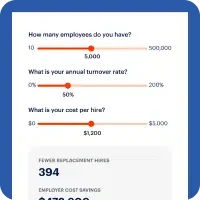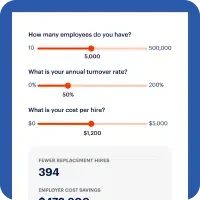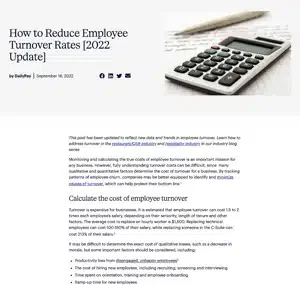It’s one of the many questions plaguing HR leaders: what’s the best way to retain my employees? And we all know the answer is simple, the solution is slightly harder to figure out.
The happier your employees are, the longer they’ll stay. The key for HR leaders is figuring out a strategy that keeps them happy. This understanding is at the core of any successful employee retention strategy.
A successful employee retention strategy will include various methods to increase a company’s yearly retention rate, such as improving employee morale, financial wellness and engagement.
What Causes High Turnover and Low Employee Retention?
Disengaged workers are one of the main contributors to high turnover rates. Low employee engagement can be a sign of potential employee retention troubles. According to a 2021 Gallup Poll, only 36% of employees are engaged in their jobs, with 15% reporting that they’re actively disengaged.
And the reason for disengagement can vary, but it is often financial insecurity. Workers who are worried about whether they can pay their bills are going to be less engaged at work.
While turnover rates will vary from organization to organization, the least engaged employees tend to have the highest turnover rates.
What’s New in Employee Retention Strategies for 2023?
An employee retention strategy aims to increase a company’s year-over-year retention by providing methods to improve employee morale and, ideally, encourage employees to remain at the company.
Organizations that don’t have an effective employee retention strategy may suffer from high turnover and the associated adverse effects that impact culture, revenue and customer service.
Competitive Pay
Attractive and competitive pay not only involves how much an employee gets paid but how often. Fifty-nine percent of employed Americans, including 70% of hourly workers, say they would benefit from getting paid more frequently than they currently do.
Better access to earned wages through on-demand pay helps employees to manage and overcome their financial stress, avoiding negative effects on productivity and morale. Sixty-seven percent of users say DailyPay has helped them reduce financial stress.
Outstanding Employee Benefits
Eighty-seven percent of employed Americans say it is at least somewhat important that their employer offers a retirement savings program, such as a 401(k) account.
In addition to the standard benefits package that employees expect, a comprehensive benefits package that goes above and beyond competitors will give a hiring edge and contribute to employee appreciation and retention.
Offering on-demand pay as a benefit can help employers better serve their employees.
Support Employee Wellness
Employees are looking for ways to improve their work/life balance and reduce their stress levels. When employees are dealing with personal or financial stress, they may perform their job poorly or with less efficiency.
Employers can further help employees through financial wellness support. This can include personalized financial counseling, financial education courses, debt reduction programs and support groups.
Additionally, companies can offer employee wellness programs that include fitness perks, support work-life balance and more.
Employee Growth and Development
Supporting employees in their career growth and development will help set them up for success.
According to a 2021 Gallup report, 48% of American workers would switch to a new job if offered skills training opportunities and 65% of workers believe employer-provided upskilling is very important when evaluating a potential new job.
Employers should consider how they can assist employees to upskill and progress their careers within the company instead of pursuing outside opportunities to further their careers including leadership training courses and classes.
Rewards and Recognition
Recognizing an employee for their hard work can play an important role in motivating and retaining employees.
According to the Harvard Business Review, recognition can significantly increase intrinsic motivation, performance and retention rates.
Employers should consider how to improve their reward and recognition programs with meaningful rewards that tangibly help employees. Real-time cash rewards give employees instant payments instead of a gift card that may cause compliance issues for employers.
Recognize and incentivize employees with cash rewards in real-time with Reward by DailyPay. Reward helps employers to leverage the power of DailyPay to increase retention and engagement even further while driving behaviors that matter most to your business.
Improve Employee Retention With Earned Wage Access from DailyPay
In addition to these five employee retention strategies, employers can further support their employees with earned wage access (also known as on-demand pay).
Earned wage access from DailyPay has improved retention, employees’ financial wellness and their opinion of employers.
Across industries examined by Mercator Advisory Group in a DailyPay-commissioned study, the average turnover rate improved by 35% for workers with EWA solutions. Additionally, the average tenure of employees who used DailyPay increased by 27% over non-DailyPay users. This 27% increase in tenure translates to 39 additional days on the job.
Start improving your employee retention strategy today with DailyPay.
FAQs
-
What is employee retention and how it is measured?
Employee retention is the percentage of employees who remain with an organization year to year. To calculate employee retention, divide the number of employees by the number of original employees and multiply that number by 100 to get your percentage.
-
What’s the difference between employee retention vs employee turnover?
Employee retention is the percentage of employees who remain with an organization year to year. The percentage of employees leaving an organization determines the turnover rate.
-
Why is employee retention crucial for businesses?
High employee retention can improve retention, employee morale and revenue.
-
Which industries have the lowest employee retention rate?
Industries with the highest turnover rates include accommodation and food services: 86.3%, leisure and hospitality: 84.9%, retail trade: 64.6% and professional and business services: 64.2%.9
-
Which industries have the highest employee retention rate?
Industries with the lowest turnover rate include state and local education: 16%, state and local government (including education): 18% and the federal government: 18.8%10
-
Is there a correlation between pay and employee retention?
If employees feel well-compensated, they’re less likely to look for a new job. Attractive and competitive pay not only involves how much an employee gets paid but how often. Fifty-nine percent of employed Americans, including 70% of hourly workers, say they would benefit from getting paid more frequently than they currently do.11
All information herein is for educational purposes only and should not be relied upon for any other use. The information herein does not constitute the rendering of financial advice or other professional advice by DailyPay. No fiduciary obligation or duty exists, or is created, between you and DailyPay. DailyPay does not warrant the completeness or accuracy of any information provided to you.
1 https://www.gallup.com/workplace/352949/employee-engagement-holds-steady-first-half-2021.aspxv:DailyPay, 2020
2 Harris Poll Consumer Finances study commissioned by DailyPay and Funding Our Future, 2021 :DailyPay, 2020
3 November 2022 DailyPay User Survey :DailyPay, 2020
4 Harris Poll Consumer Finances study commissioned by DailyPay and Funding Our Future, 2021 :DailyPay, 2020
5 https://www.cultureamp.com/blog/employee-wellness-programs:DailyPay, 2020
6 https://www.gallup.com/analytics/354374/the-american-upskilling-study.aspx:DailyPay, 2020
7 https://hbr.org/2021/03/research-a-little-recognition-can-provide-a-big-morale-boost:DailyPay, 2020
8 EWA Report, Mercator Advisory Group commissioned by DailyPay, 2021 :DailyPay, 2020
9 https://www.bls.gov/news.release/jolts.t16.htm:DailyPay, 2020
9 https://www.bls.gov/news.release/jolts.t16.htm:DailyPay, 2020
11 Harris Poll Consumer Finances study commissioned by DailyPay and Funding Our Future, 2021 :DailyPay, 2020














